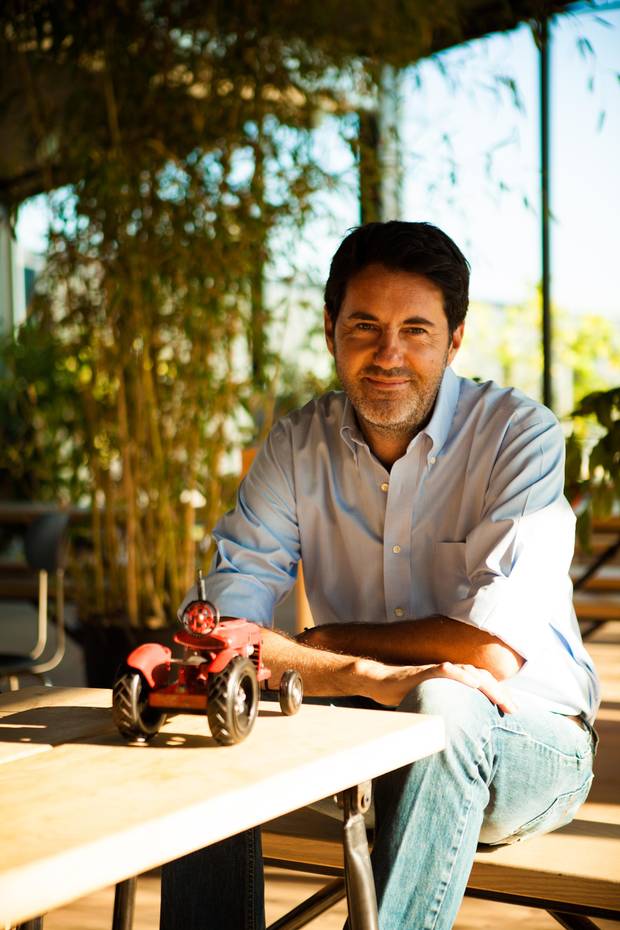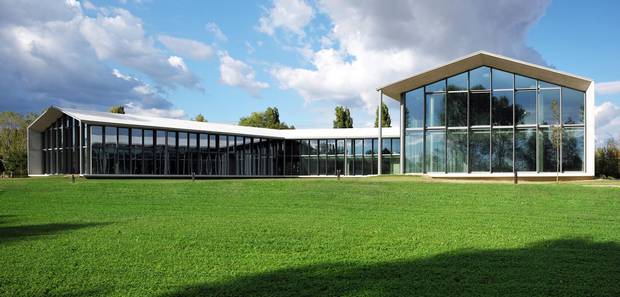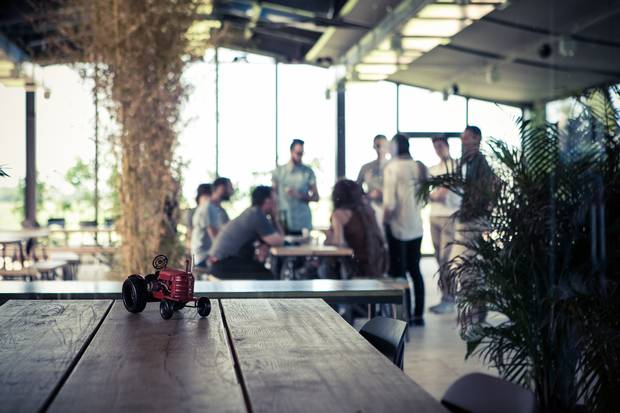From the road, it could be mistaken for any other agricultural property in the area. The site is a little tidier, perhaps, with a discreet parking lot tucked under the shade of tall cypress trees. Even though there are no chickens and the cattle grazing on the bucolic lawn are actually sculptures made of fiberglass, the picturesque campus near one of the curves of the river Sile in the Veneto region of northern Italy is still a farm. Sort of.
Riccardo Donadon dreamed up H-Farm as Italy's first private incubator for seed-stage venture capital investments with business acceleration services, specifically focused on digital businesses. The "H" of its name stands for human, and that's evident in the care lavished on a novel approach to design conducive to cultivating and harvesting ideas.
"It was born from a simple idea and a great vision," the co-founder and CEO says via email. "Simplicity, courage, ambition, curiosity, enthusiasm, ethics, determination – these are the values guiding our corporate culture and our daily approach to work, and these values have to become a standard for all the people taking part in our project." What he envisioned in 2005 was an ambitious plan of restoration and adaptive reuse of abandoned farm buildings, as well as several additions, that would nurture a new generation and reverse the flow of entrepreneurs and tech talent out of the country. The startups that now fill the complex run the gamut from retail to financial services, tourism, food and wellness to smart homes, connected cars and fashion wearables. Eighty startups have already gone through the four-month mentorship program, with €19.8-million invested to date. By 2019, there will also be H-Campus, a residential and educational offshoot built next to a nearby lagoon where 250 young entrepreneurs will study, live and work.

Co-founder and CEO Riccardo Donadon chose the property because he felt it was important that employees, working mostly on tech initiatives, have a connection to the outdoors.
Located between Treviso and Venice in the same region as the headquarters of Benetton, Diesel and Bottega wine, Donadon chose the location "first because it is beautiful," he says. "And then, because we work with technology and innovation, it is important to have continuous contact with nature and its natural cycle." H-Farm was created out of one of the many derelict farm complexes that dot the Veneto countryside. To become a tech hub, it was transformed in stages by the Treviso-based architecture firm Zanon Architetti Associati. It's one of 20 projects featured in the Italian Pavilion at this year's Venice Architecture Biennale.
"The decline of agriculture that has characterized the last decades has led to the abandonment of lands and rural buildings that were traditionally dedicated to management and breeding," architect Mariano Zanon says. "A result of this phenomenon is the presence of dozens of abandoned and compromised casali [traditional farm houses] that didn't get any social conversion in the community."


Derelict farm buildings were restored and reconstructed with things like glass-panel walls.
Originally, Zanon restored the main building, or casone, and its loggia, a silo, barn and structure that had served as a manger into communal workspace. These main administrative buildings are now open plan with glass panel walls and exposed ceiling beams. "It is no more the classical [work]space with fixed stations, well-defined roles and functions," Zanon says. "As is the technological innovation which takes place in them, working spaces are dynamic, free and informal." There are deep, bed-sized sofas for catnaps and oversized armchairs for lounging. The meeting room and computer labs are named after visionary engineers (Alan Turing, Steve Wozniak) and populated with Eiffel and bentwood chairs.
"The main element of the whole project is the green [space]: It has the role of defining outer space, making it enjoyable and maintaining the natural faunal and floral balance," Zanon adds. "Similarly, nature is entering the indoor aggregation areas, recreating the feeling of well-being transmitted by the natural environment of the countryside." It's green inside as well as out. Systems collect and redistribute rainwater for irrigation and other functions in the on-site garden, and energy is geothermal and solar. The entrepreneurs themselves are as often found in their respective huts as at the bench tables in La Serra (Italian for greenhouse), where they take breaks in the long and low central canteen building for a change of scenery. In that space, diffused light streams in through floor-to-ceiling windows lined with potted plants, and the daily gourmet meals are made from scratch on the premises. The organic offerings provide the workforce with a nearly zero-mile diet.
The pitched fully-glazed structure is filled with a profusion of ferns, beat-up tufted leather sofas (sometimes pulled outside onto the grass to make the most of a sunny day) and crates of leafy plants. Retractable screens and flexible bench tables change the space to suit the day's agenda. As a result of its amenities and multifunctionality, La Serra is the farm's de facto hothouse of ideas.
The building regularly hosts H-ack, H-Farm's intense 24-hour hackathons; challenges are thrown down by sponsors like Jack Daniels or the Luxxotica eyewear group. During last fall's fitness-focused hackathon, Technogym brought in its cardio equipment and developers jogged as they brainstormed ways to update the workout machinery's Android-based open-platform consoles. Start-up residents also drop in to watch the Eurocup finals or have a drink before the Home Festival, an outdoor music gathering that temporarily dots the fields with colourful tents and revelers. When you talk of being social at H-Farm, it doesn't refer to social media but good old-fashioned face time.



The company’s cafeteria is lined with potted plants, while meals featuring organic ingredients are made on the premises.
On a tour of the facility last spring with H-Farm's wellness accelerator manager Benedetto Linguerri – who wore the international techie uniform of jeans, a grey hoodie and New Balance sneakers – I noticed the ways H-Farm takes its mission seriously, but doesn't take itself too seriously. Signposts on the property point to the "Seed Village," a pun on the site's agricultural heritage and venture cap lingo. Another denotes 9,740 km, the distance to Palo Alto, the California birth place of Facebook, Pinterest and PayPal. And rather than being gendered, washrooms are separated by, well, function. Large signs on the grass are shaped like the teardrop markers that pinpoint locations on a digital map.
The group of 13 grey huts that house the startups are scattered like toy blocks among the trees and pedestrian footpaths gridded through the grounds. In one of these airy spaces, I met Nicola Peduzzi, Marco Signori and Michelangelo Ravagnan, childhood friends and startup partners who launched the peer-to-peer online boat charter platform Antlos (think Airbnb for seafarers). They were in the second, investment phase of the accelerator then and have since graduated to being capitalized as a viable business.

The north end of the property features four new pavilion buildings flanking the canteen, with canopied galleries exposed to the outdoors and vines forming a trellis over the buildings. Inside the glass rooms, walls are emblazoned with quotes about creativity and time from Andy Warhol, Charles Darwin, Bruce Lee and Steve Jobs. One example: "Design is not just what it looks like and feels like. Design is how it works." In the case of H-Farm, design is also about embracing how one way of working in the past can still hold inspiration for the way we will work in the future.